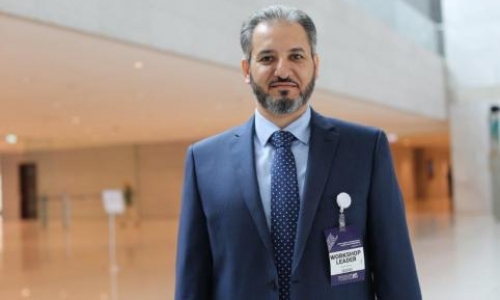Communicating Across Cultures and Languages during COVID-19

By Mazen Alfarhan
The need for accurate language services at Qatar’s healthcare facilities has never been greater. Fortunately, HBKU’s TII has helped the country’s interpreters and translators adapt to the linguistic and cultural challenges posed by COVID-19.
While doctors, nurses and other healthcare professionals are on the frontline of efforts to tackle COVID-19, they are being ably supported by a cast of thousands who are experts in their own fields. These include interpreters and translators, two professions whose importance to the smooth running of Qatar’s public services predates current challenges. However, thanks to training provided by the Translating and Interpreting Institute (TII) at Hamad Bin Khalifa University (HBKU), they have seamlessly fitted into the country’s strategies for keeping residents safe, healthy and informed.
In some respects, it very much remains business as usual for language professionals working in Qatar’s healthcare sector. Despite the challenges posed by COVID-19, residents continue to experience and suffer from other ailments for which a full range of interpreting and translation services are required. Accordingly, the need for accurate language services at Hamad Medical Corporation (HMC) and other key locations remains unabated. That said, COVID-19 has nevertheless prompted adjustments to workloads. Conveying information between medical staff, patients and individuals in quarantine has undoubtedly increased in intensity, most notably when it comes to treatment and prevention.
Many of Qatar’s interpreters and translators are also likely to be engaged in more public-facing activities, including the development of materials that raise awareness of COVID-19 among the wider population. Given the country’s vast expat community, this activity requires professionals with knowledge of common languages and cultural norms on each continent. In this respect, TII was recently requested by the Ministry of Foreign Affairs (MOFA) to interpret and translate key updates on COVID-19 into Bengali, Hindi, Nepali, Sinhalese and Urdu.
The need for live interpreting and translating at this time is also great, with the Supreme Committee for Crisis Management and the Ministry of Public Health (MOPH) providing daily updates and press conferences. From there, interpreters are essential features of dialogue between Qatar’s relevant government ministries and regional representatives for the World Health Organization (WHO).
Irrespective of where they are currently working, a significant number of Qatar’s healthcare interpreters and translators have benefitted from graduate and training courses developed and provided by HBKU. These include TII’s Master of Artsin Translation Studies (MATS), a two-year program designed to train translators working across the public and private sector, as well as international organizations. In 2014, MATS obtained validation from the University of Geneva, which also awarded TII with the Faculty of Translation and Interpreting (FTI) Quality Label. Such validation on both fronts also underpins TII’s reputation for producing interpreting and translating professionals who meet internationally recognized standards.
More recently, TII rolled out its Master of Arts in Intercultural Communication (MAICC), the first degree program of its kind in Qatar. Students will gain a deeper understanding of changing intercultural settings at home and abroad. Particular attention is paid to the three mediational forms of interpreting in intercultural settings and work environments that are specific to Qatar, including the healthcare sector. The program also offers elective courses on the use of digital technologies to achieve effective intercultural communication. These include Qatar Computing Research Institute’s (QCRI) Advanced Transcription System (QATS), which uses deep learning technologies to convert speech to text.
Language professionals working in Qatar’s healthcare settings benefit from TII’s ability to provide extensive sector-specific training. This revolves exclusively around the interpreting and translating of medical and health-related content. Learning is broken down into four categories: diseases and disorders, anatomical terminology and translation resources; clinical and therapeutics, with a focus on imaging and pathology reports; forensic medicine and toxicology, with a focus on medico-legal reports; and public health reports, medical brochures and patient information leaflets.
However, what makes this training truly credible is that course leaders are both professors of translation and qualified medical doctors. For instance, one of TII’s offerings was led by a certified medical translator with diplomas in clinical pharmacology and public health services. TII was also planning a short medical training program to be led by a doctor-translator working at the WHO Regional Office for the Eastern Mediterranean.
Qatar’s response to COVID-19 has also provided TII with food-for-thought. As things stand, complex civil emergencies and contingency planning are not features of its course content. This must change. Fortunately, interpreters and translators working within the country’s health sector appear to have adapted quickly to what is proving to be a very fluid situation. Looking ahead, TII is determined to strengthen their capabilities with relevant training and development opportunities.
Now more than ever, patients have the right to be informed about medical conditions and the treatment that healthcare professionals provide. This applies as much to Qatar’s indigenous population as those residents who do not count Arabic as their mother tongue or lingua franca. Accordingly, the need for highly-trained interpreting and translating professionals in healthcare settings has never been greater. The same is also true for interpreters engaged in public awareness campaigns organized by the Ministry of Interior and others. In both instances, TII is proud to have contributed to Qatar’s efforts to confront COVID-19.
Mazen Alfarhan is a reviser and trainer at Translation and Interpreting Institute (TII), which forms part of the College of Humanities and Social Sciences (CHSS) at Hamad Bin Khalifa University (HBKU).
This article is submitted on behalf of the author by the HBKU Communications Directorate. The views expressed are the author’s own and do not necessarily reflect the University’s official stance.








